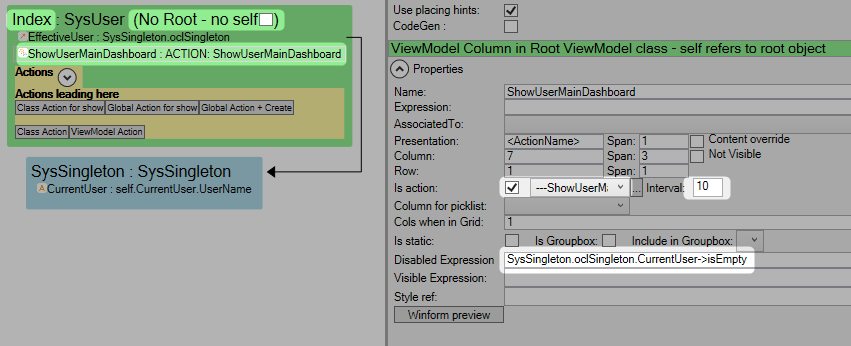Navigating without user interaction
m ((username removed) (log details removed)) |
No edit summary |
||
| (4 intermediate revisions by 3 users not shown) | |||
| Line 1: | Line 1: | ||
{{Edited|July|12|2025}} | |||
<message>Write the content here to display this box</message> | |||
Sometimes, for example, after a user has logged in, you want to automatically navigate to another page. | Sometimes, for example, after a user has logged in, you want to automatically navigate to another page. | ||
Do this: | Do this: | ||
# Place a [[Period action]] on the form. | # Place a [[Documentation:Periodic action|Period action]] on the form. | ||
# Set a navigating action on it. | # Set a navigating action on it. | ||
# Set the disabled expression to something like "disabled when not logged in". | # Set the disabled expression to something like "disabled when not logged in". | ||
# Set the interval to something other than -1 (disabled) for example 10 (ms). | # Set the interval to something other than -1 (disabled) for example 10 (ms). | ||
'''Note!''' If you create a ViewModel that requires a root object, be sure to send it or your action will NOT RUN. The [[Index page]] is called without a root object. For this reason, use SysSingleton.oclSingleton instead. | '''Note!''' If you create a ViewModel that requires a root object, be sure to send it or your action will NOT RUN. The [[Documentation:Index page|Index page]] is called without a root object. For this reason, use SysSingleton.oclSingleton instead. | ||
Example of an Index (web) page that automatically navigates to a user dashboard upon login. | Example of an Index (web) page that automatically navigates to a user dashboard upon login. | ||
[[File:Automatic navigation on Index page.png|none|thumb|851x851px]] | [[File:Automatic navigation on Index page.png|none|thumb|851x851px]] | ||
[[Category:Navigation]] | [[Category:Navigation]] | ||
Latest revision as of 05:01, 28 January 2025
This page was created by Lars.olofsson@mdriven.net on 2019-06-10. Last edited by Stephanie@mdriven.net on 2025-01-28.
Sometimes, for example, after a user has logged in, you want to automatically navigate to another page.
Do this:
- Place a Period action on the form.
- Set a navigating action on it.
- Set the disabled expression to something like "disabled when not logged in".
- Set the interval to something other than -1 (disabled) for example 10 (ms).
Note! If you create a ViewModel that requires a root object, be sure to send it or your action will NOT RUN. The Index page is called without a root object. For this reason, use SysSingleton.oclSingleton instead.
Example of an Index (web) page that automatically navigates to a user dashboard upon login.

